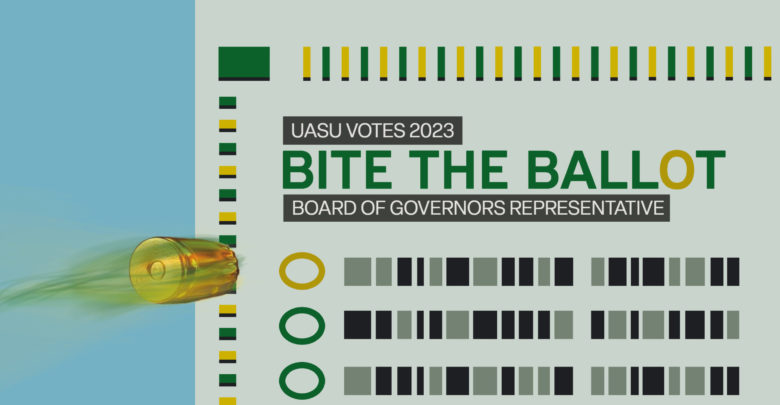 Arthur Macatangay
Arthur MacatangayFor the third year in a row, the Board of Governors representative (BoG rep) race is uncontested. Stephen Raitz, a law student by day and local campus celebrity by night, is the only candidate.
The BoG rep is a volunteer elected by the student body to voice their concerns to the BoG. The BoG rep is also a voting member of the Students’ Union (SU) and General Faculties Council (GFC).

Stephen Raitz
Stephen Raitz doesn’t present a platform with revolutionary ideas, but it is realistic and shows he has a thorough understanding of the job. Both in his platform and at forums, Raitz has emphasized the fact that BoG Rep faces a unique challenge: lack of support.
“The BoG Rep has no admin, no support. They literally just show up — they’re volunteering their own time,” said Raitz at the Myer Horowitz forum.
As such, it is not possible for them to take on all the issues that plague students.
Raitz didn’t have a ton of time at the mic at the forums, but his platform is based on three major issues: affordability, communication, and engagement.
In regards to affordability, his platform details advocating against future tuition increases. This year, a lot of the affordability initiatives meant to ease the burden of tuition increases are only for domestic students. He addresses this in his platform and promises to work with the International Students’ Association (ISA) to improve the international student tuition model and ensure “that scholarship and bursary programs include international students.”
International students must pay tuition on a program-based model where they are charged a flat program rate per a semester, even in the spring and summer, and even when they are taking fewer than five courses. This places a greater financial burden on students who are already paying exorbitant tuition fees. To work around this, Raitz promises to advocate for making changes to the model, which could lessen the load for international students.
He has also repeatedly stated how he wants to advocate for students for issues like accountability regarding exceptional tuition increases in certain faculties, during this time of academic restructuring.
“Let’s respond to them and make the administration react and fix things that respect both the limited capacity of the position and my energy to do as much as possible,” said Raitz describing his platform at the Myer Horowitz forum.
Interestingly, Raitz has illustrated how he would take a data-driven approach to advocacy at the International Students’ Association (ISA) forum. Instead of focusing as much on conveying students’ stories to the board, he mentioned how he believes the BoG is better persuaded by data. This is definitely a more pragmatic approach, and makes it clear that he is not coming in with guns blazing, wanting to overhaul the system. Instead, he has a smaller but achievable list of goals, with realistic solutions.
When asked about what he would do to advocate for more diverse representation on the board, Raitz had a practical yet discouraging answer. Membership in the U of A BoG is set in legislation and controlled by the provincial government, so it would be difficult to advocate for more diverse representation on the board itself.
He explained how his hands are pretty much tied in this situation. But using a volleyball analogy described how he can consult and listen to what current student issues are, and communicate that to the board. “Students are setting things up to the BoG Rep to then spike at the Board of Governors.”
Despite his flaws, Raitz has one thing under his belt that no former candidate has had — ability to engage. With his immense social media presence and just being a pretty fun dude, he is capable of boosting engagement for a position that, historically, no one cares about.
Students don’t realize how powerful the BoG is, making all the final decisions on matters that directly affect students. As such, the BoG rep needs to be loud and be able to make themselves heard by this group of adults that probably don’t care much about what students have to say.
Raitz has proven that he is more than capable of making himself heard, but the question remains: is that sustainable? Will his approach to advocacy, to quote his platform: “do the friggin’ job,” “engage like it’s everybody’s business,” and “be fun and be the best I can be” be well-received by the BoG long-term?
Who will win, and who should win?
Raitz’s uncanny ability to engage, and also the fact that he is running uncontested makes the odds significantly in his favour. I think he is very likely to win.
Despite having a pretty vague platform, and not having the opportunity to speak much at forums, Raitz has proven his commitment to the job. He has a much deeper understanding of the position than previous BoG rep candidates, who have underpromised with extremely short platforms. In comparison, his is 15 pages long and fairly comprehensive.
For a position as important as the BoG rep, we need someone who has proven they are committed by showing they have a plan to move forward and better our lives as students.
All things considered, Raitz has proven his commitment to the role, and no one can say he is lacking enthusiasm, so he has my vote. Best of luck to him, and in his own words, “mwah.”
Every year, The Gateway publishes hundreds of articles like the one you just read that are free for everyone to access. But The Gateway needs your support to continue publishing its award-winning journalism. Please consider donating today, even a small amount can help the University of Alberta’s only newspaper continue serving the campus community. Thank you.




